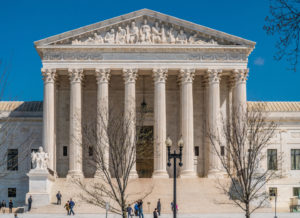Oklahoma Supreme Court rules against Catholic charter; Gov. Stitt appeals to US Supreme Court
After a ruling Tuesday by the Oklahoma Supreme Court that denied a Catholic school a charter, the governor issued a statement appealing to the Supreme Court of the United States to overturn the…

After a ruling Tuesday by the Oklahoma Supreme Court that denied a Catholic school a charter, the governor issued a statement appealing to the Supreme Court of the United States to overturn the decision.
“I’m concerned we’ve sent a troubling message that religious groups are second-class participants in our education system,” Gov. Kevin Stitt, a Republican, said in a statement. “Charter schools are incredibly popular in Oklahoma – and all we’re saying is: we can’t choose who gets state dollars based on a private entity’s religious status.”
The suit denying the charter was brought by Oklahoma’s Attorney General, Gentner Drummond, also a Republican, who called the decision “a tremendous victory for religious liberty.”
Drummond had claimed previously that a victory for the virtual Catholic charter school would open the door to state-funded Sharia schools and schools sponsored by Satanists.
“The framers of the U.S. Constitution and those who drafted Oklahoma’s Constitution clearly understood how best to protect religious freedom: by preventing the State from sponsoring any religion at all,” Drummond said in a statement.
In a 6-2 ruling, Oklahoma’s Supreme Court found that the law allowing the charter violated both the U.S. and the Oklahoma constitutions. The court condemned the attempt by the school to “evangelize the Catholic school curriculum while sponsored by the state.”
“This State’s establishment of a religious charter school violates Oklahoma statutes, the
Oklahoma Constitution, and the Establishment Clause [of the U.S. Constitution],” wrote the court’s majority.
Justice Dana Kuehn dissented from the majority opinion, arguing that the refusal to recognize a charter solely on the basis of a religious affiliation is a violation of the Free Exercise Clause of the First Amendment to the U.S. Constitution.
Kuehn noted that Montana recently had a similar case where the state’s Supreme Court found the use of state scholarships funds at religious schools violated the state’s blatantly anti-Catholic “Blaine Amendment,” which prohibits the funding of “sectarian” schools.
The high court in Montana was subsequently overruled by the U.S. Supreme Court, said Kuehn.
“The state is not required to partner with private entities to provide common education. But if it does, it cannot close the door to an otherwise qualified entity simply because it is sectarian. … Contracting with a private entity that has religious affiliations, by itself, does not establish a state religion, nor does it favor one religion over another,” wrote Kuehn.
Kuehn predicted that ultimately the U.S. Supreme Court would overturn the majority in the Oklahoma case.
The statewide, online charter school was billed as the first-ever religious charter school after the state’s Virtual Charter School Board voted in 2023 to approve its application.
Known as St. Isidore’s, the school was named after the patron saint of the Internet.
St. Isidore was busy recruiting staff and waiting on $1.2 million in state funding that was due next week.
The Associated Press reported the school already has 200 enrolled students, but the archdiocese is uncertain if the school will open in the fall now because of the court’s decision.
Oklahoma’s State Superintendent of Education, Ryan Walters, who supported St. Isidore’s charter application, said the fight isn’t over yet.
“It’s my firm belief that once again, the Oklahoma Supreme Court got it wrong… This ruling cannot and must not stand. There will be additional legal action in support of those parents and the millions of Oklahomans who believe deeply in religious liberty,” said Walters.



